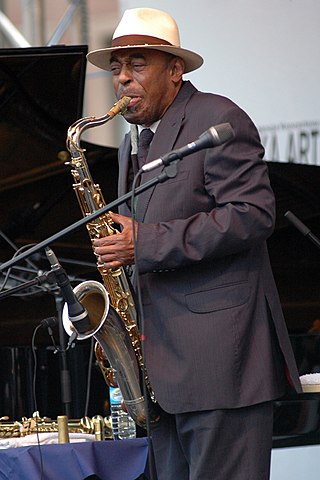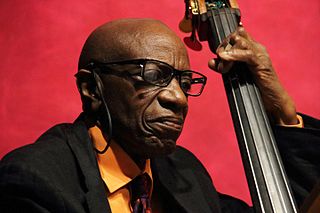Related Research Articles

Archie Shepp is an American jazz saxophonist, educator and playwright who since the 1960s has played a central part in the development of avant-garde jazz.

Rashied Ali, born Robert Patterson was an American free jazz and avant-garde drummer who was best known for performing with John Coltrane in the last years of Coltrane's life.

William Robert Dixon was an American composer and educator. Dixon was one of the seminal figures in free jazz and late twentieth-century contemporary music. His was also a prominent activist for artist's rights and African American music tradition. He played the trumpet, flugelhorn, and piano, often using electronic delay and reverb.
Grachan Moncur III was an American jazz trombonist. He was the son of jazz bassist Grachan Moncur II and the nephew of jazz saxophonist Al Cooper.
Alan Shorter was a free jazz trumpet and flugelhorn player, and the older brother of composer and saxophone player Wayne Shorter.
William Godvin "Beaver" Harris was an American jazz drummer who worked extensively with Archie Shepp.

Reginald "Reggie" Workman is an American avant-garde jazz and hard bop double bassist, recognized for his work with both John Coltrane and Art Blakey.

Marion Brown was an American jazz alto saxophonist, composer, writer, visual artist, and ethnomusicologist. He was a member of the avant-garde jazz scene in New York City during the 1960s, playing alongside musicians such as John Coltrane, Archie Shepp, and John Tchicai. He performed on Coltrane's landmark 1965 album Ascension. AllMusic reviewer Scott Yanow described him as "one of the brightest and most lyrical voices of the 1960s avant-garde."
Makanda Ken McIntyre was an American jazz musician, composer and educator. In addition to his primary instrument, the alto saxophone, he played flute, bass clarinet, oboe, bassoon, double bass, drums, and piano.
Frank Wright was an American free jazz musician, known for his frantic style of playing the tenor saxophone. Critics often compare his music to that of Albert Ayler, although Wright "offers his honks and squawks with a phraseology derived from the slower, earthier funk of R&B and gospel music." According to AllMusic biographer Chris Kelsey, Wright "never recorded even a single record under his own name for a major label; he was 'underground' his entire career." In addition to tenor saxophone, Wright also played the soprano saxophone and bass clarinet.
Muhammad Ali is an American free jazz drummer.

Cameron Langdon Brown is an American jazz double bassist known for his association with the Don Pullen/George Adams Quartet.

Bobby Few was an American jazz pianist and vocalist.

John Betsch is an American jazz drummer.
The New York Contemporary Five was an avant-garde jazz ensemble active from the summer of 1963 to the spring of 1964. It has been described as "a particularly noteworthy group during its year of existence -- a pioneering avant-garde combo" and "a group which, despite its... short lease on life, has considerable historical significance." Author Bill Shoemaker wrote that the NYCF was "one of the more consequential ensembles of the early 1960s." John Garratt described them as "a meteor that streaked by too fast."
Joe Ford is an American jazz saxophonist.

Charles Davis was an American jazz saxophonist and composer. Davis played alto, tenor and baritone saxophone, and performed extensively with Archie Shepp and Sun Ra.
In the late 1960s, Latin jazz, combining rhythms from African and Latin American countries, often played on instruments such as conga, timbale, güiro, and claves, with jazz and classical harmonies played on typical jazz instruments broke through. There are two main varieties: Afro-Cuban jazz was played in the US right after the bebop period, while Brazilian jazz became more popular in the 1960s. Afro-Cuban jazz began as a movement in the mid-1950s as bebop musicians such as Dizzy Gillespie and Billy Taylor started Afro-Cuban bands influenced by such Cuban and Puerto Rican musicians as Xavier Cugat, Tito Puente, and Arturo Sandoval. Brazilian jazz such as bossa nova is derived from samba, with influences from jazz and other 20th-century classical and popular music styles. Bossa is generally moderately paced, with melodies sung in Portuguese or English. The style was pioneered by Brazilians João Gilberto and Antônio Carlos Jobim. The related term jazz-samba describes an adaptation of bossa nova compositions to the jazz idiom by American performers such as Stan Getz and Charlie Byrd.

Down Home New York is an album by the American jazz saxophonist Archie Shepp, recorded in 1984 and released on the Italian Soul Note label.
Clarence Hardy "C." Sharpe was an American jazz saxophonist.
References
- Scott Yanow, Saheb Sarbib at Allmusic
- Gary W. Kennedy, "Saheb Sarbib". Grove Jazz online.